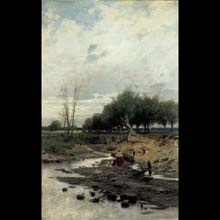
material: oil on canvas
dimensions: 211 × 117 cm
description: Roman Kochanowski was one of Polish Munich painters associated with the Iser art circle for the longest time. He drew inspiration from the works of the Barbizon School artists and Camille Corot. Landscape Near Krakow is an example of large-format works, not very common in the oeuvre of Kochanowski. It depicts a rural landscape with a motif of a half-dry water body in the foreground. The depth of the composition is emphasized by a willow avenue. The realistic representation of landscape is complemented by the staffage distinctive of his oeuvre: rural girls with a bevy of geese and grazing cattle. Women’s red garments serve as a counterpoint to the subdued colours of the view. People and animals harmoniously blend with the surrounding world. The painting is marked by the authenticity of the painterly experience of nature. Moreover, as far as form and iconography are concerned, it represents Munich mood landscape known as “stimmung” painting. Following the requirements of art critics in the country, the artist tried to impart a native quality to the composition: he attired the women in Krakow costumes and included a willow in the landscape part of the picture, a tree which is generally considered Polish. The landscape, executed in 1883, was painted over by Kochanowski three years later. The changes concerned the figural part and the signature. Aleksandra Krypczyk
exposition: The Gallery of 19th Century Polish Art in Sukiennice,
The Cloth Hall, 1, Main Market Square
key: Realism, polish impressionism, beginnings of symbolism >>>
dimensions: 211 × 117 cm
description: Roman Kochanowski was one of Polish Munich painters associated with the Iser art circle for the longest time. He drew inspiration from the works of the Barbizon School artists and Camille Corot. Landscape Near Krakow is an example of large-format works, not very common in the oeuvre of Kochanowski. It depicts a rural landscape with a motif of a half-dry water body in the foreground. The depth of the composition is emphasized by a willow avenue. The realistic representation of landscape is complemented by the staffage distinctive of his oeuvre: rural girls with a bevy of geese and grazing cattle. Women’s red garments serve as a counterpoint to the subdued colours of the view. People and animals harmoniously blend with the surrounding world. The painting is marked by the authenticity of the painterly experience of nature. Moreover, as far as form and iconography are concerned, it represents Munich mood landscape known as “stimmung” painting. Following the requirements of art critics in the country, the artist tried to impart a native quality to the composition: he attired the women in Krakow costumes and included a willow in the landscape part of the picture, a tree which is generally considered Polish. The landscape, executed in 1883, was painted over by Kochanowski three years later. The changes concerned the figural part and the signature. Aleksandra Krypczyk
exposition: The Gallery of 19th Century Polish Art in Sukiennice,
The Cloth Hall, 1, Main Market Square
key: Realism, polish impressionism, beginnings of symbolism >>>












